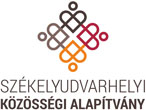I. Management and administration systems
Principle: A Community Foundation (CF) is legally constituted as a foundation with the mission of supporting the development of a geographic area defined by statute.
A Community Foundation operates programs in its geographical area. When a Community Foundation has the opportunity to develop programs in the area served by another community foundation, it will enable partnership with that foundation. A CF can accept donations from outside its geographical area.
Principle: The Foundation is independent and free of the direct or [tooltip title=”Direct or indirect affiliation with an organization, institution, company or political party includes the affiliation as a member, the affiliation as a member of the steering committee, holding majority of shares, being an employee of the organization or institution, receiving financial benefits from an organization or institution or being first or second-degree relative of someone who receives.”]indirect[/tooltip] control of an individual, organization, institution, company or political party.
Standards:
- The management board of a CF consists of at least 5 people and at least 50 % of the board members must reside in the community.
- A person that has a leadership position (at a national, county or local level) in a political party can’t be part of the steering committee or the executive management of the Foundation.
- No institution, organization, company, political party or individual has direct or indirect influence or control over 33 % or more than 33 % of the members of the management board of the Foundation.
Principle: The foundation has an active board of directors that act with integrity, they understand the community’s needs and reflect on its diversity.
Standards:
- The Foundation has a receiving process of the management board members that ensures the understanding of their role in the foundation’s structure and legal responsibilities.
- Board members may not receive financial reward for their contribution to the work of the Foundation and do not receive preferential treatment in business relations with the CF.
- A Foundation will not fund organizations or institutions affiliated with Board Members, founders, management team or grant-making committee members. It will not provide financial support through scholarships or any other form of individual financial support for those that were mentioned above or for their first and second-degree relatives. The Foundation may enter into partnerships with these organizations to mobilize resources.
Principle: The Foundation has a professional and transparent management.
Standards:
- A CF has an annual operational plan reviewed and approved by the management board.
- A CF has for the management board a clear and transparent policy on supervision of financial transactions, accepting donations, fund management and investment grants, ethics and transparency of the Community Foundation’s activity. The implementing process of these policies is monitored annually by a censor and/ or by an external expert at board’s request. The results of this audit are available for the expert/ committee responsible with the national accreditation standards.
- Community foundations perform annually an independent control conducted by an auditor registered at the Chamber of Financial Auditors of Romania, employing international auditing standards. The deadline for finalizing the financial audit is 30th of June, next year of the audited one. An annual report for the previous year is available on the website and in a printed version, no later than the 31th of July. The Foundation’s website will publish the previous annual reports, at least for the last three years. The report shows a list with all of the organizations and beneficiaries of grants and scholarships with their full names and with the granted amounts. It also provides a clear view of the financial situation of the Foundation, including major areas of incomes and expenses, as well as assets and permanent funds.
Principle: The foundation is in permanent contact with the community foundations’ movement agenda by providing information, actively participating in annual events, online dialogue and other joint actions of community foundations.
Standard: CF provides for the Community Foundations of Romania a summary that contains information about its funds, donors, board and volunteers, grants awarded and annual financial situation based on the monitoring system nationally agreed.
- Grant making and community leadership
Principle: The steering committee and CF’s staff seek proactively to understand the essential needs, resources and opportunities in their geographical area.
Standard: The Foundation initiates dialogue with beneficiaries and donors for setting the goals of funding programs and requests a clear description and justification of needs in the forms that ask for funding.
Principle: A CF provides support for the potential beneficiaries of a grant in order for them to understand the policies and processes of grant making and to plan and effectively communicate their own projects and ideas.
Standard: The Foundation communicates to the public the funding opportunities through a clear documentation of these processes, including decision-making criteria. A CF must have clear and accessible application forms for funding requests. A CF must also provide additional information on the request of those who are eligible for funding.
Principle: Takes all necessary steps to ensure that grants are used for the intended and contracted purposes.
Standard: CF requires from its beneficiaries to submit narrative and financial reports and also documentation that support the reports. The Foundation verifies these expenses in relation to grant’s purpose.
III. Resource mobilization and philanthropy development
Principle: The fundraising activities are based on continuous communication and negotiation with the donors, developing trust and transparency with those who contribute with resources.
Standards:
- A CF provides for the donors information about the opportunities they have to support their community and send them regular updates (at least annually) on how their resources were used.
- A CF, during the development of a funding program, communicates to donors the fixed amount/ percentage of the raised funds that is going to be invested in the community as grants and the amount/ percentage that will cover the administrative expenses of the Foundation (grant making phase, communication, fundraising and administration).
- A CF keeps confidential all the private information about donors and eventual donors acquired throughout the philanthropic process.
I. Management and administration systems
- A community foundation (CF) is legally constituted as a foundation with the mission of supporting the development of a geographical area defined by statute.
- The main means by which the Foundation contributes to the development of the geography area are by the growth of philanthropy and the support offered to local initiatives by providing financial help.
- It is independent and outside the direct or indirect control of an individual, organization, institution, company or political party.
- The Foundation has an active board of directors acting with integrity, understanding the needs of the community and reflects its diversity. The Foundation has a professional and transparent management process.
- The Foundation is in permanent contact with the agenda of the community foundations’ movement by providing information, actively participating in annual events, online dialogue and other joint actions of the community foundations.
- Grant making and community leadership
- A community foundation shows a broad understanding of the social problems, local needs and opportunities, aiming at creating a positive and lasting impact through the role it has: grant making and community leadership.
- Steering Committee and CF’s staff aim to proactively understand the essential needs, resources and opportunities in their geographical area.
- Use most of the generated resources to enable innovation and the spirit of the community in various sectors of the community through grants, scholarships and other financial support, to independent development initiatives. Stimulates the understanding of the local community and its participation in shaping development solutions by involving inhabitants in the analysis of the needs, program planning, funding decisions, program evaluation and fundraising.
- Stimulates partnerships, dialogue, learning, voluntary participation and pooling of resources through grants and community leadership initiatives.
- Develops the capacity of local funded organizations, supporting them to become more efficient, effective and better equipped to meet the challenges of the community by providing financial support for development, learning and sharing additional resources and expertise.
- Provides support to potential beneficiaries of grants in order for them to understand the policies and processes of grant making and how to plan and effectively communicate their own development projects and ideas.
- Takes all necessary steps to ensure that grants are used for the intended and contracted purpose.
- Constantly evaluates the impact of the grants and own initiatives for the community. Encourages and supports evaluation practices and documenting the impact on the beneficiaries of the grants.
III. Resources mobilization and philanthropy development
- A community foundation demonstrates best practices in philanthropy development services, by encouraging donors engagement in understanding the needs of the community and the local context, helping them to formulate and achieve philanthropic goals, combining their interests with community’s needs and of the organization’s and by identifying innovative and responsible ways to give a lasting impact on their investment.
- Provides flexible mechanisms that allow donors and volunteers to get involved, a large part of the community to contribute and it also provides personalized services to individual donors, respecting their needs and charity interests.
- Bases its fundraising activities on continuous communication and negotiation with donors, developing trust and transparency in relation to those who contribute with resources.
- It is dedicated to supporting local solutions with resources that were collected from the local community, focusing specifically on the involvement of local donors.
- Develops funding programs and fixed assets, and encourages partial and full contributions to permanent funds.
It helps the public to understand the philanthropic process by providing information to prospective donors about these processes and creating new mechanisms for donors engagement and commitment.


